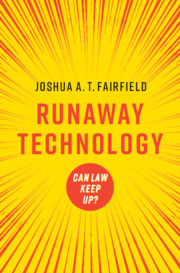
-
Select format
-
- Publisher:
- Cambridge University Press
- Publication date:
- 01 January 2021
- 25 February 2021
- ISBN:
- 9781108545839
- 9781108426121
- 9781108444576
- Dimensions:
- (228 x 152 mm)
- Weight & Pages:
- 0.57kg, 306 Pages
- Dimensions:
- (228 x 152 mm)
- Weight & Pages:
- 0.46kg, 306 Pages
- Subjects:
- Law, Law and technology, science, communication
You may already have access via personal or institutional login- Subjects:
- Law, Law and technology, science, communication
Book description
In an era of corporate surveillance, artificial intelligence, deep fakes, genetic modification, automation, and more, law often seems to take a back seat to rampant technological change. To listen to Silicon Valley barons, there's nothing any of us can do about it. In this riveting work, Joshua A. T. Fairfield calls their bluff. He provides a fresh look at law, at what it actually is, how it works, and how we can create the kind of laws that help humans thrive in the face of technological change. He shows that law can keep up with technology because law is a kind of technology - a social technology built by humans out of cooperative fictions like firms, nations, and money. However, to secure the benefits of changing technology for all of us, we need a new kind of law, one that reflects our evolving understanding of how humans use language to cooperate.
Reviews
'Can democracy keep pace with technology? Yes, says Joshua Fairfield, but only if we swiftly adapt the language of law itself.'
Edward Castronova - Indiana University
'Professor Fairfield has given us a critically important and engaging book. It is urgent, yet has timeless wisdom. It is erudite, but also highly accessible. It is consequential yet still laced with commendable levity. Runaway Technology is a must-read not just because of its insight into whether the law can keep up with modern technology, but because of its perspective on the law itself as a tool for human flourishing.'
Woodrow Hartzog - Northeastern University
'Fairfield's Runaway Technology offers a powerful argument for the centrality of law to our efforts to tackle a range of contemporary threats through organization and cooperation. Recent decades have seen a shift in power away from legal institutions and towards private actors and the technologies they control. By rejecting the reductive turn to economics and techno-determinism that drive policymaking today, Fairfield reminds us that law, when properly conceptualized as a dynamic social technology, provides a set of tools for constructing, adapting, interrogating, and justifying the narratives that guide our culture and our future.'
Aaron Perzanowski - Case Western Reserve University
‘… stimulating, intelligent, challenging … I encourage you to read the book …’
Christina Spiesel Source: Metascience
‘This book will appeal to readers who want a deeper understanding of how language, and the language of law, can be cooperatively used to effect social and legal change.’
Sally Sax Source: Canadian Law Library Review
'[Fairfield's] arguments are not only entertaining but well written ... Highly recommended.'
J. A. Stever Source: Choice
Contents
Metrics
Altmetric attention score
Full text views
Full text views help Loading metrics...
Loading metrics...
* Views captured on Cambridge Core between #date#. This data will be updated every 24 hours.
Usage data cannot currently be displayed.
Accessibility standard: Unknown
Why this information is here
This section outlines the accessibility features of this content - including support for screen readers, full keyboard navigation and high-contrast display options. This may not be relevant for you.
Accessibility Information
Accessibility compliance for the PDF of this book is currently unknown and may be updated in the future.


